How to Start a Blog that Changes Your Life
Depending on the month and Google's mood, 10,000 to 20,000 people read this site per day.
The various products associated with the site earn over $10,000 a month, almost entirely passively. Last month they made over $60,000.
This blog got me my first marketing internship, helped launch my first side hustle (and every side project since), and landed me my first marketing job. It created my "real job," plus a bunch of other people’s jobs, through Growth Machine, a content marketing & SEO agency.
It lets me meet tons of interesting people, and has allowed me to steadily build an audience who, for some reason or another, are interested in what I have to say.
But that wasn't always the case.
When I started this blog in fall 2014, I was a senior in college majoring in philosophy with no job prospects.
My only goal was to create a place to practice content marketing, and hopefully use that practice to land a job. I knew getting some kind of marketing work was my best way to avoid my worst nightmare: having to slink back to the corporate consulting career track.
Almost no one read it for the first year, except for whoever saw me sharing articles on Facebook or when I would get a few upvotes on Reddit. I didn't consistently have 100+ daily visitors until 9 months after starting.
Quite a bit has changed since then.
_I should mention too that I now have a whole course on building & monetizing a site like this called SEO for Solopreneurs. _Check it out !
Why this Post, and How it's Structured
There are plenty of articles on "how to start a blog." They mostly focus on what hosting company to use and how to find a theme. But those are the easy parts. The hard part is making something other people care about that elevates your career and life. "Starting a Blog" is easy. "Starting a Blog that Changes Your Life" is hard.
But it's something everyone can, and should, do. It doesn't matter what field you're in, whether or not you want to be an entrepreneur, or whether or not you ever intend to make money from it. A well-developed site is your resume, your real estate, your time machine, and your second brain. It helps anyone learn more about you, how you think, and why they should care. And for you, it helps clarify your thoughts, share what you know, and build a reputation.
As such, this is not about how to start a marketing blog that changes your life. Or how to start a blog for your business (here's a good one about that). It's about starting one for yourself and about yourself, that you can leverage for anything you do in your life.
This is a long post. It should be saved, revisited, and digested in pieces. So I've broken it up based on the important aspects. I'll do my best to update it over time as I think of new topics to include, or as any of my thoughts on what to do change.
Here’s everything I’m going to cover, feel free to jump around and make it a choose-your-own-adventure article:
- Setting Up the Blog
- Publishing Frequency & Building the Writing Habit
- What to Write About
- Promotion: How to Get Readers
- Monetization & Spotting Opportunities
Setting Up the Blog
Sign up for Webflow.
Yes, you're going to pay $20 - $30 a month. This is a blog that changes your life. Changing your life is worth $20 - $30 a month. Going cheap and using a free WordPress theme on BlueHost is how my site got hacked and almost destroyed back in 2016. Don't go cheap!
Webflow has a bit of a learning curve, but once you're up to speed it is an order of magnitude better than WordPress, especially for a personal site. Watch some of their tutorial videos, start playing with it, and you’ll figure it out.
For the design, find a nice template to start. You can create your own layout if you want, but don’t get too hung up on it. I created this site based on the Independent Publisher WordPress theme.
Don't try to make the site perfect on the first try. If you spend more than a weekend designing and getting it started, you spent too long. Not to be a downer, but hardly anyone is going to see it for the first few months, so it’s okay if your navigation bar isn't 100% perfect. Keep tinkering over time, keep improving as you find little aspects to change, and don't worry about it too much.
If you already have a blog on WordPress, or prefer WordPress, great. Feel free to stick there, but make sure you use a good hosting provider (I use WPEngine and I've heard good reviews for Flywheel).
Please, please do not use BlueHost, HostGator, GoDaddy, or another cheap hosting company. It will come back to bite you eventually. Other bloggers only recommend them because they get paid $100+ per BlueHost signup they get. If a blogger is seriously recommending you host your site on BlueHost, they care more about their affiliate commissions than about giving you good advice.
If you're on Squarespace, Medium, WIX, or anything else, switch. Their SEO isn't great, and you’ll run into the limitations of the platform eventually. More on SEO later.
Alright, quick pause: notice how this section was super short? That’s because this part barely matters. If you spend more than 4 - 6 hours setting up the V1 of your site you’ve overthought it. Whip up something rough to get started on, and if you can stick to publishing regularly then you can invest in making it pretty.
Way too many people obsess over launching with a perfect site and never go live. If that’s you, it’s not because you want perfection, it’s because you’re afraid. Afraid to put yourself out there, afraid to publish your writing, afraid of what Jeff from high school might think when he sees you sharing your blog on Facebook. But screw Jeff, he’s a loser anyway. Get over the fear and put yourself out there.
Publishing Frequency and Building the Writing Habit
The most important requirement for creating a blog that changes your life is continuing to publish on it.
You can occasionally change your life with one article, but it's rare. A life changing blog is a long-term, compounding project that requires you to keep working on it.
Over the last 6 years on this site, I've published 171 (now 172!) articles, 263 notes from books, and 215 Monday Medleys. That's 650 pieces of content, over ~2,100 days, or something every 3-4 days. That's kind of insane, I didn't even realize it was that much stuff until I did the math.
You don’t have to try to copy my frequency, nor should you. The publishing frequency you should aim for is determined by which of two buckets you fall into.
Bucket 1: You Have the Writing Itch
Is writing something you already feel self-motivated about and have some itch to do? Do you feel off if you haven't published something in a while? Is your first instinct when you get interested in something to write about it? Congrats, you have the writing itch! Ignore any compulsion to stick to a schedule. If you're doing a blog like this one, you'll be fine whether you publish once a month or once a day.
That's not to say you shouldn't publish frequently, only that you shouldn't publish only to publish something. Especially if you have a well-defined niche, you're going to run out of topics or repeat yourself or overcomplicate it eventually.
But having some requirements, even with the writing itch, can help. I don't force myself to write an article every week since that'd be impossible with posts like this one. But I do force myself to publish a Medley every week since they require me to keep reading.
Bucket 2: You're New to Publishing Your Thoughts Online
Is writing a habit you're not used to? Does it feel like a chore? Are you uncomfortable publishing your thoughts online? No worries, everyone starts here, and that feeling quickly goes away. You can quit having a schedule eventually, but you first have to make yourself someone who feels compelled to write. Until you're in that camp, you need a schedule.
It doesn't matter if it's 1, 3, or 5 posts a week. Set one you think you can stick to and stick to it. Since writing is not your job, start low to set yourself up for success. If you think you can do 2-3 posts per week, aim for 1 to start.
This schedule is temporary. It's to get you in the habit of putting your work out there regularly and to develop the itch for writing. But as soon as writing is a habit you’re “pulled” to do, ditch the schedule and focus on quality.
Start by publishing often until you have more article ideas than you'll ever have time to write, and until you know you'll keep writing without a fixed schedule.
Again, there's no right answer here. I'll sometimes go 3-4 months without a new post. Seth Godin publishes every day. Wait But Why once went a year and a half without publishing.
Find a cadence that works for you to produce work you're proud of.
What to Write About
It's the posts you spend the longest thinking about that will land the biggest splash. Not necessarily the ones you spend the longest writing. But the longest thinking about and preparing for. This post has been 6 years in the making, so I'm cautiously optimistic it'll do quite well.
The longer you've spent thinking about a topic, the more you'll probably have to say, which is why most of your posts should tend towards being longer. If you're not used to writing long articles, keep trying to see what else you can say about whatever you're writing about. If your interest in the subject only lasts 500 words, it's probably not a great post. Most of mine end up being at least 1,000 words, often 2,000+
The other reason to focus on writing fewer, longer posts is it condenses your knowledge into a more helpful manner for anyone looking to learn from you.
As a simple example, I have one of the most popular intro articles about Roam. I've only written one article about Roam, and only published three videos, but those pieces alone were enough to make me an authority on Roam and be the marketing for my course.
That's a combination of good SEO, and good curation. People don't want to read 10 articles or 30 guides. They want one great resource. Your job is to create a great resource for whatever you're writing about.
Should You Pick a Niche?
I don't recommend picking a niche for a personal site. This site talks about the most random assortment of topics possible. There's marketing, writing, reading, productivity, finance, psychology, hunting, a card game, dog training, drugs, sex, it's varied to say the least.
The only common theme is they're all topics I'm interested in at the time of writing. The biggest challenge isn't writing consistently, it's finding topics so interesting that you’ll write something great about them.
Every successful blogger I know of who started out focused on one niche eventually broadened away from it, and ended up branding under their own name. A narrow niche might help you get started, but you'll outgrow it and want to build authority under your own name eventually, so why not start there.
Finding Topics to Write About
To have an interesting blog, you must be interested in what you're writing about.
It's kind of hard to reverse engineer the "what to write about" question, especially since I have zero strategy behind what I write about on this site. But we can look at some of the most popular pieces to try to get some ideas.
Most of my posts, especially the good ones, fall into one of three buckets:
Things you know
This article is an example of a "things you know" post, as is my popular "wiki strategy" post. That article was inspired by my work doing content marketing and SEO for a few different sites, and publishing it led to the influx of leads that motivated me to start Growth Machine.
To write a "things you know" post, take any topic you’re interested in and share your knowledge on it. You don't need to be the top expert in the world. You need to have something useful to add to the conversation. Or, you need to show you know enough about an area to be taken seriously on it.
It's natural to run into some imposter syndrome here, so it’s helpful to remember that even if you don't know more than other people writing about a subject, you know more than everyone not writing about a subject. How many people in your field are publishing their knowledge online? 1%? So even if you're not at their level you might still be in the top 90%. Don't worry about it.
As another example, I wrote about how to learn digital marketing based on my experience quickly learning enough of it in college to get hired. Are there better digital marketers out there? Of course. But my experience was useful for other people trying to figure out how to get started in this field, and it's been read some 50,000 times:

A good way to brainstorm topics in this category is to think about what questions you regularly get asked.
If you get asked certain questions by people online, or by friends outside your industry, those are perfect topic to write about. It'll force you to distill your knowledge into something easily digestible by someone else, and it might be useful to tons of people who haven't thought to ask you about it.
Things you're excited about
Hype is contagious, so if you're excited about something, share it on your site.
My Roam article is a good example of this. I started using Roam and was excited about it, so I shared why it was exciting to me and how I was using it.
That post hit the front page of Hacker News, and has been read almost 100,000 times since it was published:
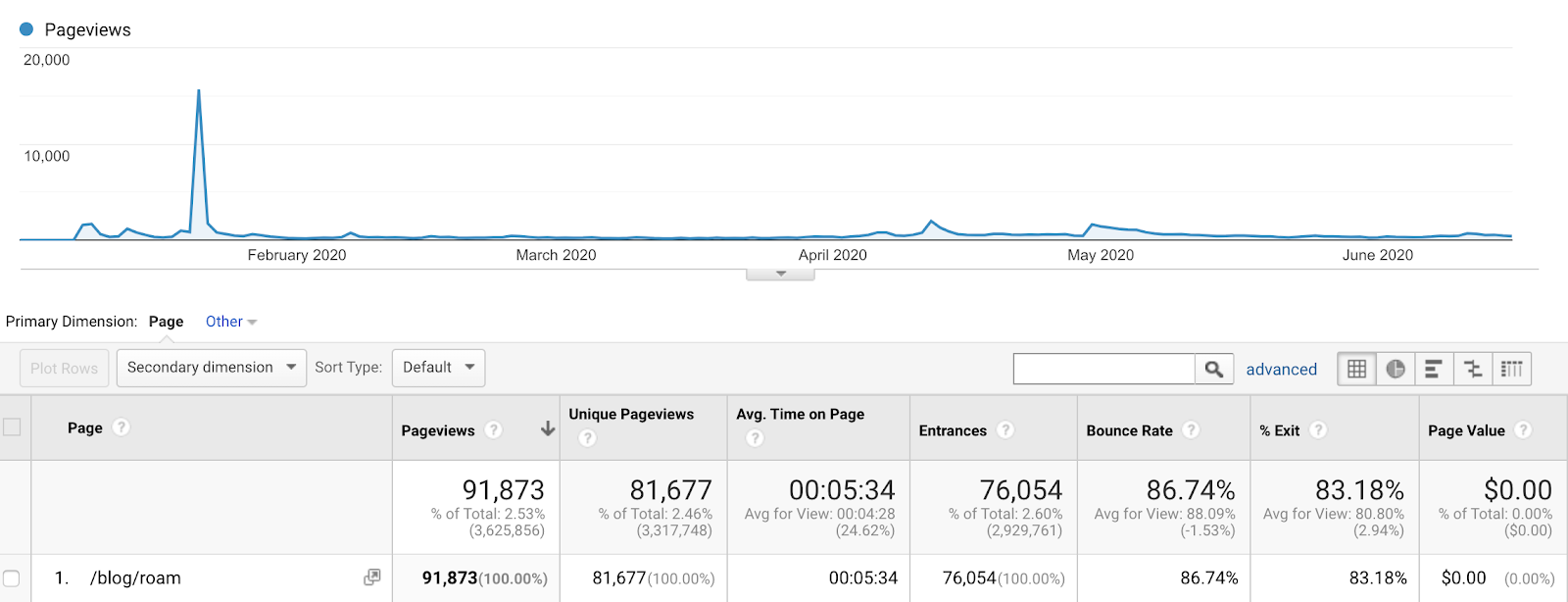
I didn't "know" anything I was sharing, but I was excited about it for a bunch of reasons and shared why I thought it was so great.
The same could be said of my water fasting article. I decided to try a 5-day water fast back before it was cool, wrote about the experience doing it, and now it has been read almost 3,000,000 times in the last 5 years.
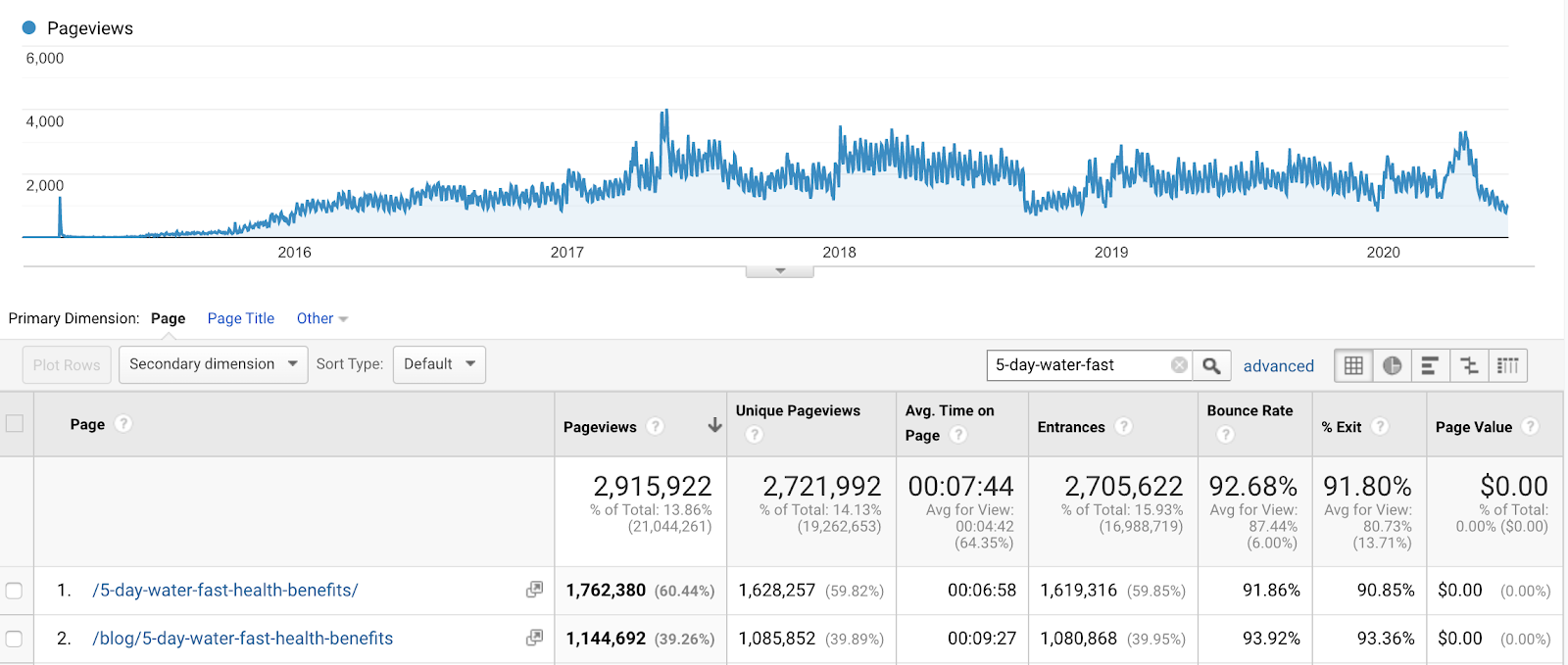
So what are you excited about? Anything you're diving into can be good material for an article.
Things you believe
The last main category I've seen tend to do well is things I believe.
My favorite example of this is my "is soylent healthy" article. I wrote it after being annoyed by otherwise intelligent people who were treating this frankenfood like an acceptable dietary supplement, so I wrote about everything I believed was wrong with it.
That obviously pissed off the soylent fanboys. There were debates about the article on reddit, and creating that controversy drove a bunch of traffic:
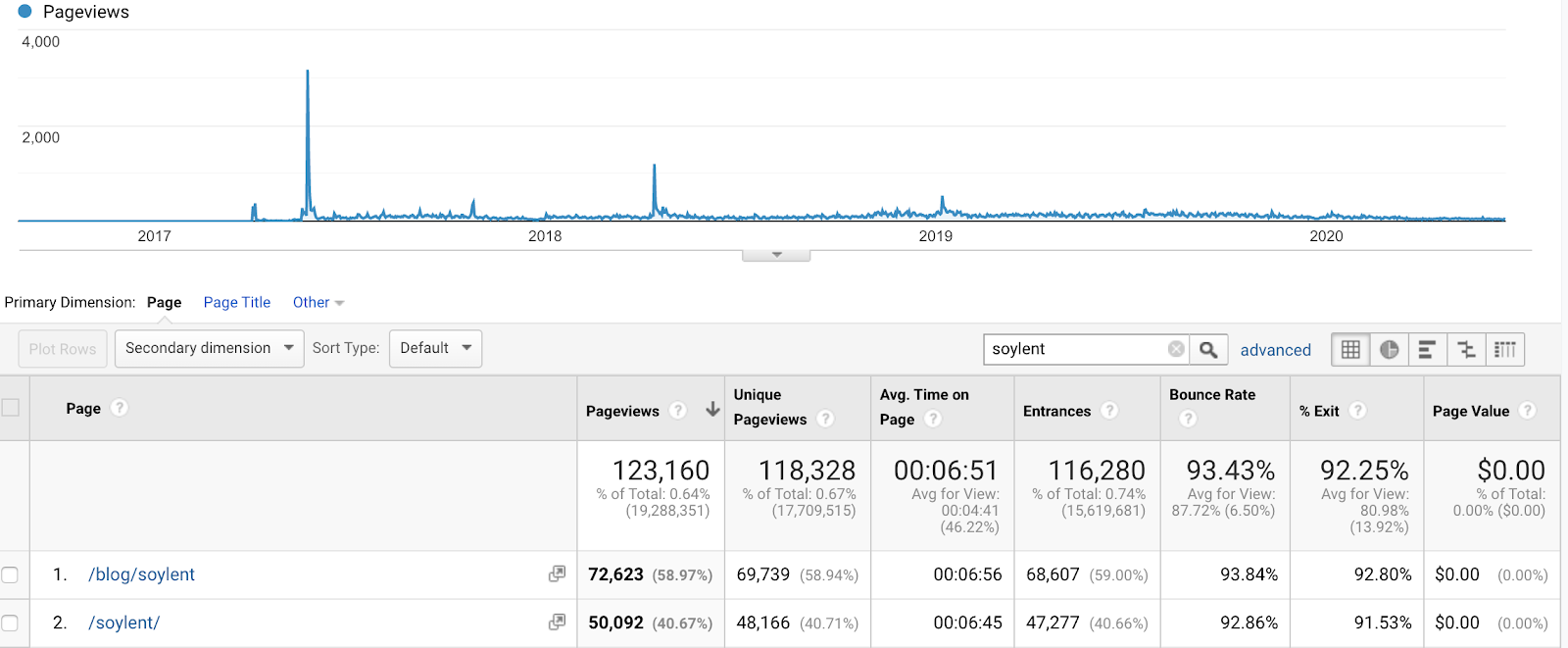
This category of articles can be intimidating because it requires taking a stance that will piss at least a few people off. If you write an "I believe" post and you don't piss some people off, you're not doing it right. But you'll find that as often as you get messages like "you idiot you're wrong" you'll get messages like "I'm so glad someone finally said that."
Another example I feel a little bad about is my "no more struggle porn" article. I don't disagree with anything I said, but I feel bad it turned into everyone being mean to Gary Vaynerchuk instead of criticizing the unhealthy hustle culture. But, the reaction to it was certainly explosive. It was one of the 20 most read Medium articles that year, with over 461,000 views total:

My article on why you should delete Facebook was similarly well received, with people piling on to criticize Facebook's horrible privacy standards:

A good heuristic for this kind of article is, if you're thinking "ehhh maybe I shouldn't write about that" then you should probably write about it. Most people are playing it safe with their content. Have an opinion and write something more interesting.
Above all else, be interesting
The only real rule is don't be boring. If you're repeating what other people have said, and not sparking new ideas or insights in your readers' minds, your articles are unlikely to do well.
You can make any topic interesting if you're sufficiently interested in it, so don't assume you have to talk about making money or getting laid or losing weight. Whatever you're interested in, if you write about it in a way that shows that interest, you're going to attract an audience.
Promotion: How to Get Readers
I don't recommend fixating on marketing or SEO or "what your readers want to read." Again, if you’re writing something for clicks and you're not interested in it, it's unlikely to turn into a good piece.
Thinking about marketing also tends to make you adjust your writing, voice, and style to try to attract people. Your goal should be for who you are online to match who you are in real life. No gimmicks, no performing, no salesmanship. Just be an interesting person.
But that doesn't mean you shouldn't do any marketing. It means marketing for a personal site has to come after you decide what to write. You shouldn't go do a bunch of keyword research and then use that to decide your posts. That'll make it hard to write about topics compelling to you.
The marketing and promotion and SEO and whatnot come after. First focus on finding good topics to write about.
So once you have a great post written, how do you maximize its chances of spreading?
There are three kinds of promotion for a site like this (in increasing order of importance):
- Surge traffic
- Evergreen traffic
- Audience traffic
Let's go through each, and how and when to use them.
Surge Traffic
Surge traffic is the thrilling spikes in traffic from many people discovering your site all at once. It's what comes to mind when you think of promoting a piece, because those huge spikes are exciting and validating and make us feel good about ourselves.
This traffic is fantastic for getting new people to discover your work, but it's temporary. Surges last a few days at best, then the virality ends and you're back where you started, with only a few more people following what you're doing.
Long term, surge traffic is the least repeatable and least useful form of promotion to focus on. But in the beginning before you have a few thousand people on your email list, it's the best tool you have to quickly grow your audience.
Surge traffic comes from one of a few places:
Social virality : You wrote a post people love, so it gets picked up on social media and is shared like crazy.
Influencers : Someone with a big audience found what you wrote and shared it.
Communities : Your piece performed well in an online community with an active userbase, and they all checked it out.
These are all hard to deliberately engineer. Most social virality comes from writing a great post at the right time. Most of Influencer surge traffic comes from... writing a great post at the right time and the right person finding it.
But community surge traffic is a little different. That one you can engineer to an extent.
In the beginning with this site, I used reddit extensively to try to get initial readers. Reddit has so many people on it, and there are communities for everything. Whenever I published a post I thought would do well there, I would find a community I could share it in, post it, and see what happened.
Most of the time, it didn't work. It wouldn't catch on and wouldn't drive any significant visitors. But sometimes it did, and it would work in a big way. Every single spike on this traffic graph from the first two years are from a reddit post. And as you can see, the daily visitors (mostly from organic traffic) slowly increased after each spike:
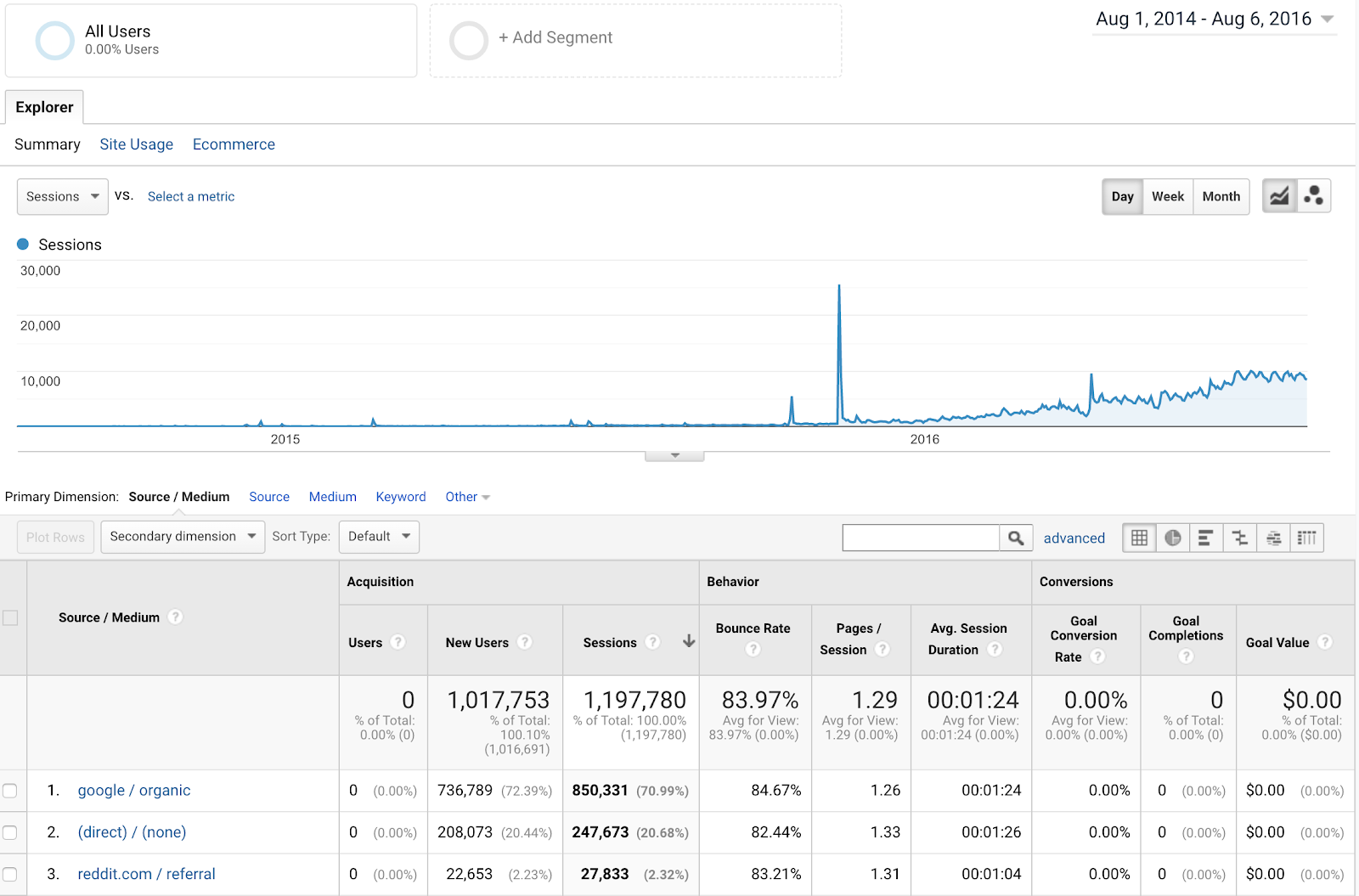
So what's the secret to getting a big spike of traffic from reddit? Unfortunately it's a fairly dull strategy: write a great article, find a good community to share it in, post it, maybe cheat a little bit by having 3-4 extra reddit accounts upvote it, and cross your fingers. It won't work most of the time, but when it does, it can be a game changer.
It also doesn't have to be reddit. Any active online community can be a great starting point for finding readers.
Evergreen Traffic
When you publish a new post it should have some potential for surge traffic, but you don't want to waste your time by producing pieces that are only valuable for a few days.
Every article should have some evergreen value if you want to maximize the effectiveness of your time spent writing. A number of pieces on this site were written 4-5 years ago and still drive substantial amounts of traffic. Compare that to the news cycle where each piece is dead in 2-3 days and you need a constant stream of new pieces.
So how do you get evergreen traffic? Well, the biggest way is through SEO. If you can write a post on a topic people are searching in Google, and have your post show up in the top few spots for that search query, you're going to keep getting traffic for a long long time.
I can't spend another 10,000 words explaining SEO here, so I'll refer you to some other useful content I've made on the subject. This old YouTube series is still quite useful, and this post and this post from Growth Machine are good. I'd also recommend the free email course I have on the Growth Machine site.
But as I mentioned earlier, you shouldn't go do a bunch of keyword research to decide what to write on your personal site. Rather, you should write what you're interested in, then see how you can add in a bit of SEO to get evergreen traffic.
For example, my water fasting article is about my experience doing a water fast, but I looked up what other details I should include to make it more competitive for the water fasting related keywords. Same with my passive income article.
I also get a ton of SEO value from my book notes. Almost a quarter of all my traffic is organic visitors to my book notes:
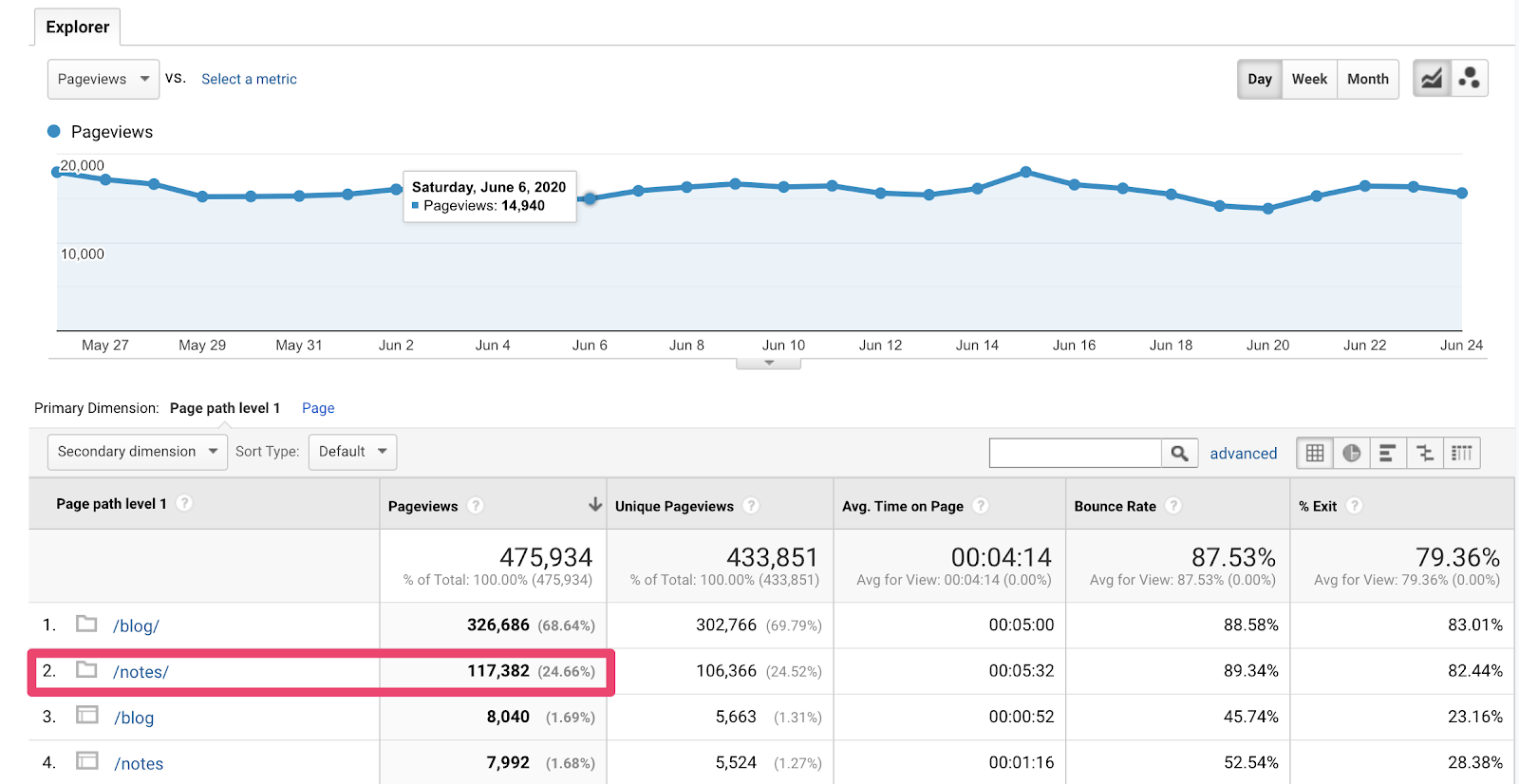
And I don't even do anything particularly SEO-driven with them, But I have a ton of them (over 250!) and each one ranks well for the book's keywords, so all together they bring in a nice little stream of traffic.
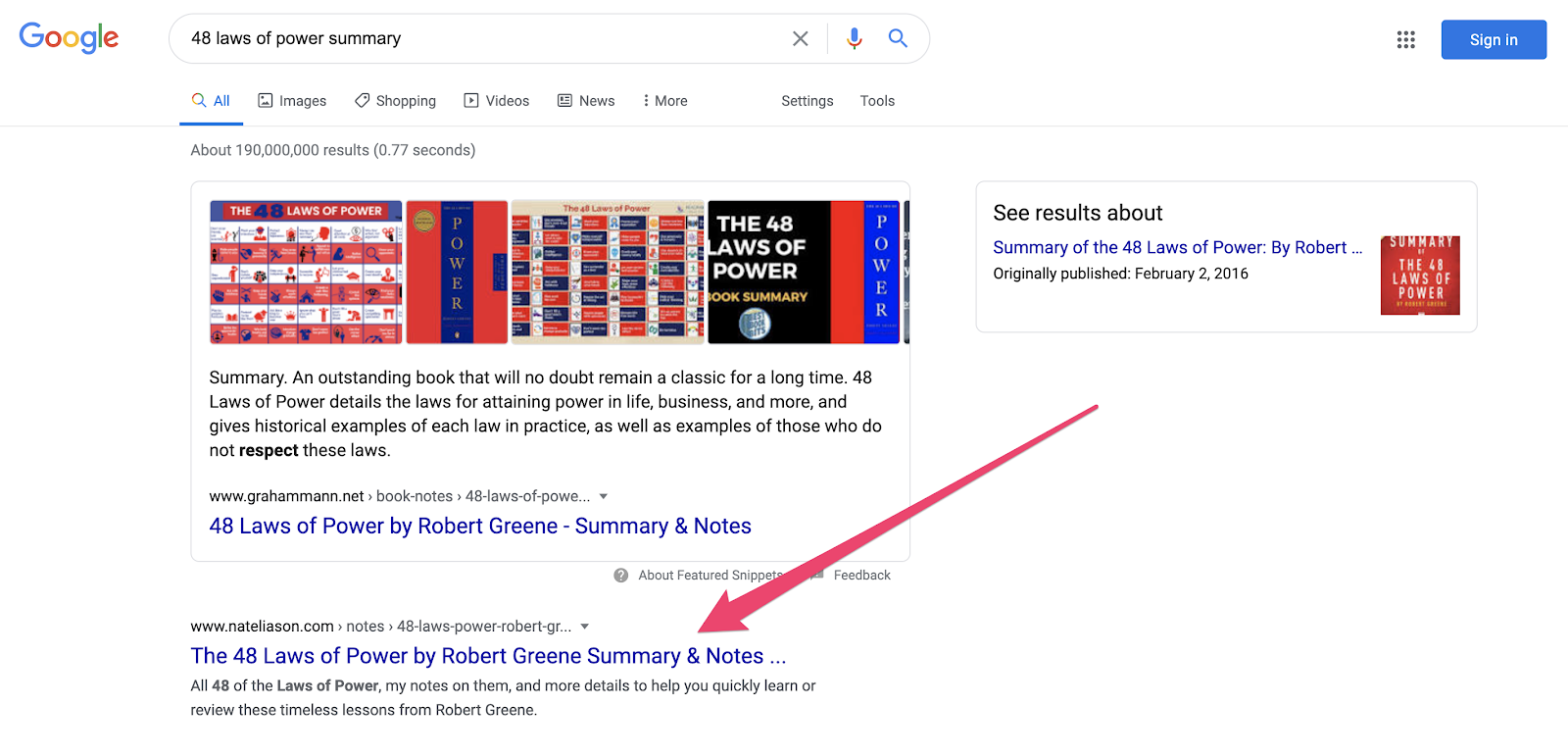
You have to know how to balance the SEO value and the article value. If I wanted this post to rank first for "how to start a blog," it would not be this in-depth or useful. So I'm giving up some of the SEO value to make it a more useful post. You'll have to decide how you want to balance it for yourself.
Audience Traffic
Audience traffic is the most valuable kind of traffic by far. It's people reading your content because it was written by you. Not because someone recommended it, or because they found it on Google, but because they know who you are and are curious to read what you think.
This is the ultimate goal for any blog. You want to build up a base of people who love what you write, and who will consider reading anything new you put out. It's where the true value of the blog comes in, because it means you're on people's minds for certain kinds of opportunities or questions they might encounter.
It's also a big part of how you monetize your site. The more audience traffic you have, the more you can make real money from your site beyond trying to get better ad CPMs. From a monetization standpoint, audience traffic is the most valuable, followed by evergreen traffic, and then surge traffic is barely valuable at all except to help people become initial members of your audience.
So how do you build audience traffic? Well, you need a way for people to get updates on whatever you're doing. The best way to do that is through at least one social media channel you're active on, and an email newsletter. RSS helps too for people who still use it.
For the social media side, I again don't recommend trying to apply some growth hacky strategy to your Twitter account. Start tweeting about what you're doing, reading, and thinking about. And interact with other like-minded people. Your following will grow over time if you're interesting. You can use other social media like Instagram or TikTok or whatever too, but I don't know how to grow an audience there.
As for email, make an account with ConvertKit or another email tool of your choice, and give people some good reason to sign up. You shouldn't expect people to sign up just to get new posts from you though: "sign up for updates on my next post!" is not compelling. Your emails themselves should provide some value, kind of like what I do with the Medley. By providing value in the body of your emails, you're giving people reason to tell others about your newsletter, and helping it grow organically over time.
Patience
The hardest part with promoting your work though is the patience it requires. It will take a long time to build up any kind of meaningful audience, and in the beginning it won’t be rewarding.
You'll only start to get traction once you find a style and area of topics interesting to other people, and it's impossible to say how long that will take.
You might explode right out of the gate, or you might not get any traffic the first few years. There are no shortcuts, because the only way to keep an audience is to keep being interesting.
Monetization and Spotting Opportunities
This site never made more than $100 in a month for the first couple years. Monetization was not the goal. But if you work on something long enough and build an audience, opportunities to monetize naturally follow.
Most people get monetization wrong: they focus on the easy ways to make money: ads and affiliate revenue. Those are fine ways to make money, but as you'll see, they’re also the least lucrative.
You should focus on building an audience and sustainable traffic before you focus on monetization. If no one is coming to your site, it doesn't matter if you tweak your CTAs or try new ads layouts. Get the audience, and the revenue will follow.
Also, monetizing a site like this the way I've monetized it can be erratic. I recommend it be your "bonus" income you don't factor into financial decisions, since you never know when it might radically decrease. It's tempting to think big increases will last forever, but they rarely do. So you have to have the right mindset. I try to pretend the site income doesn’t exist, funnel it straight to investments, and base financial decisions on my income from Growth Machine.
But once you have the audience, how do you monetize? There are three main areas of focus:
- Affiliate sales
- Advertising
- Products.
If we remove the Roam Course, here's what my revenue for this site looks like since 2018. I only included the big affiliate revenue sources. We'll come back to the Roam course later:
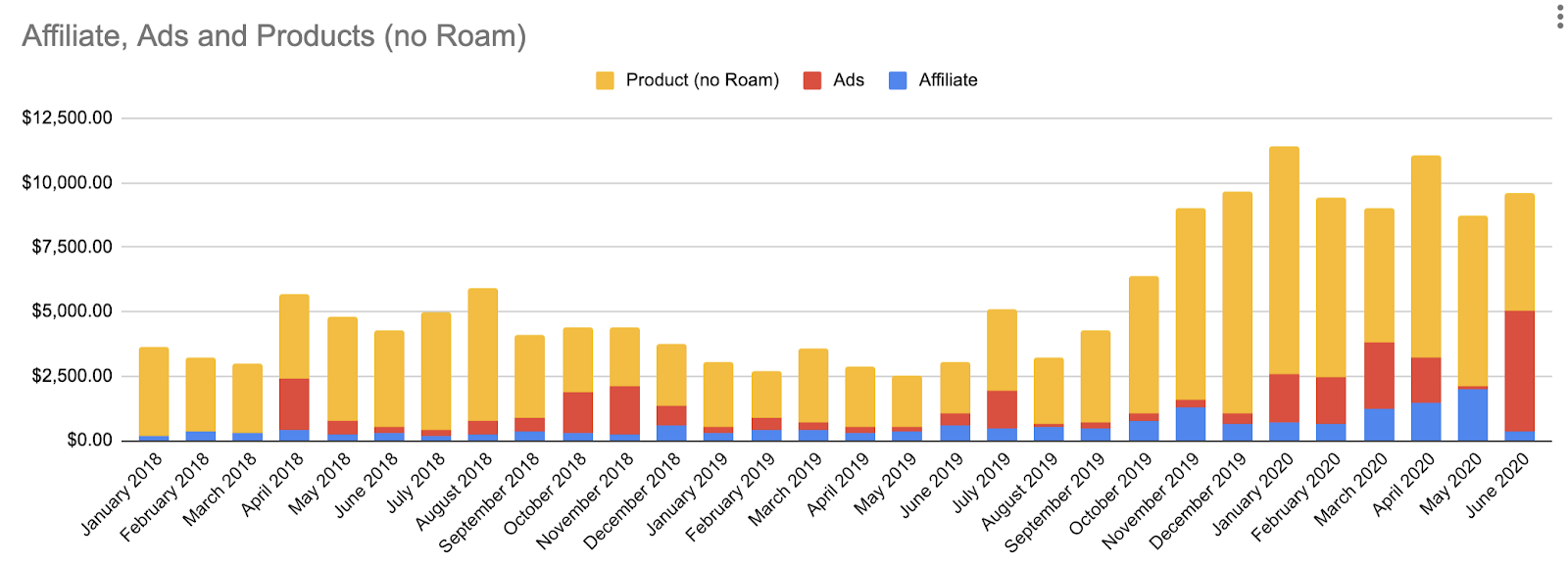
Affiliate Sales
Affiliate sales are simply getting paid to recommend a product. Entire sites are built to take advantage of affiliate programs, and some of them end up making a ton of money. Camera equipment reviews is a good example. If you're making 5-10% on each $2,500 camera you encourage people to buy, and you're getting a few hundred thousand visitors a month, you can make some serious cash. That's how Wirecutter was able to sell to NYT for $30 million.
But for a personal site, you should only use affiliate programs when they apply to products you were going to write about anyway. I'll never link to a product I don't like and use, and I don't try to shoehorn in additional products to get more affiliate clicks. When there's a relevant recommendation, like Webflow earlier in this article, I'll use an affiliate link, and that's it.
As you write on your site, you should sign up for the affiliate programs for any products you know you'll recommend. Amazon is the biggest one, which gives you a cut of any items people buy on Amazon in the 24 hours after clicking your link, but most product sites will have their own programs as well. I keep all of my affiliate links in a long Roam note, so when I recommend or mention a product, I know what link to use to get a small cut.
Some affiliate programs are better than others. Airtable's, for example, is generous, but you only get Airtable credit instead of real money. Wealthfront pays you by giving you an extra $5,000 managed for free, which seems great, but is only $12.50 a year in fees saved.
The great affiliate programs pay you cash based on signing people up. A few of the most lucrative ones for this site have been Webflow, Athletic Greens, Teachable, and Amazon. Here's what those revenue sources have looked like over time (June's data isn't in yet):
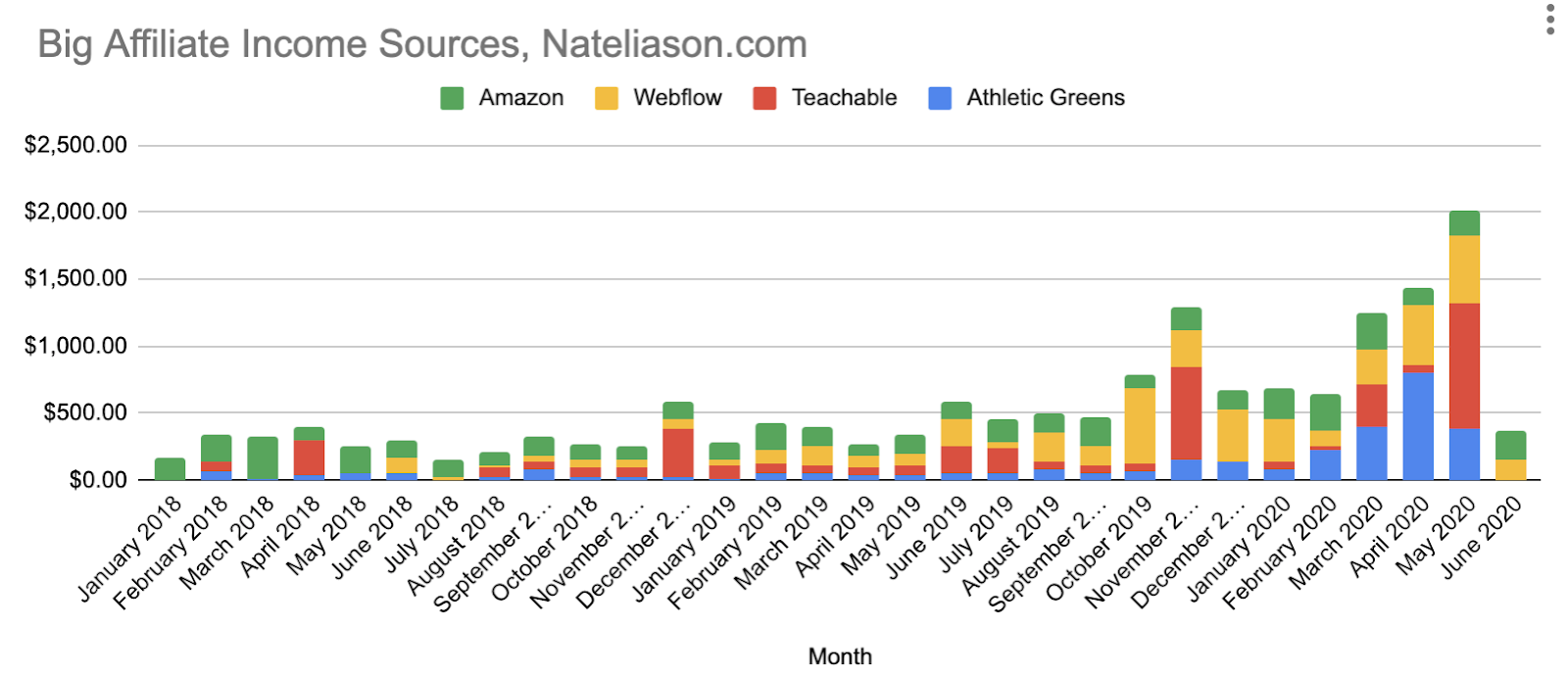
I'd say those four affiliate programs account for 90-95% of the affiliate revenue for this site. There are a number of other smaller ones that might pay $20-$50 a month which are great extras, but not enough to base your income on.
For this site, the affiliate income has been nice, but it's not massive, and not something I intend to optimize around. Treat affiliate income for a personal site as bonus money. You don't want to focus on it because you'll hurt the genuineness of your content. But when there's an opportunity to include it, why not?
Ads
Ads are the default impulse for anyone trying to monetize their site, but for a personal site they're not effective.
Google display ads pay a miniscule amount per thousand views, and the premium ads networks aren't much better. I entertained the idea of putting ads on this site at various points, but ultimately decided the small increase in income wasn't worth the damage to the reader experience. Also, it turns out advertisers don't love sites that talk about sex and drugs. Who knew.
But there have been a couple of other good ways to monetize a site like this through "advertising," and it's grown into a decent chunk of the revenue for the site:
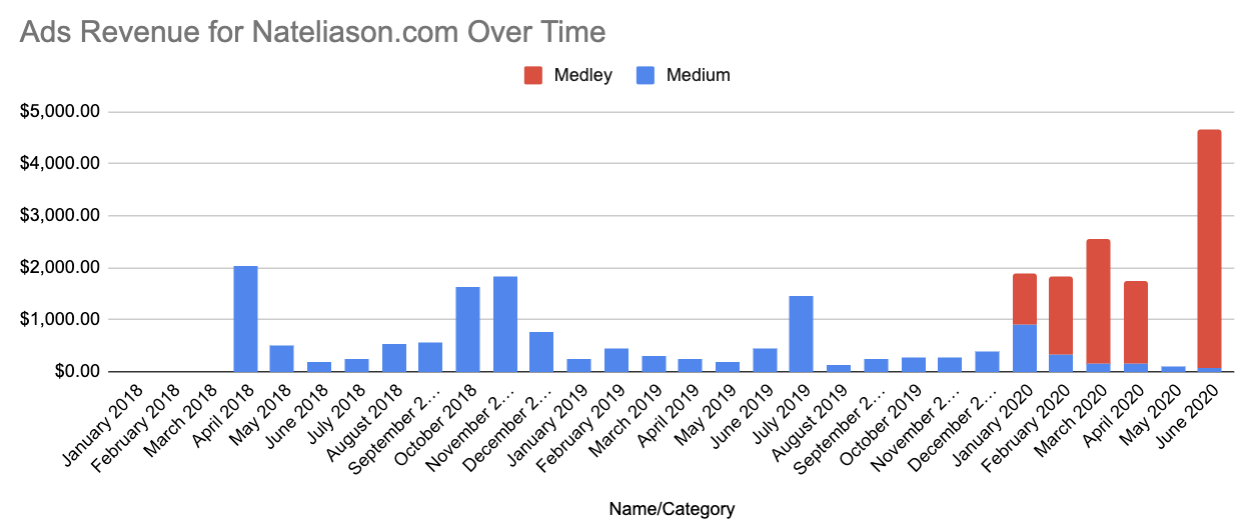
One is through sponsors for my newsletter, The Medley. I started testing this out in January of 2020 and so far I've been happy with it. I only feature products I use and like, which limits how many ads I can run, but it's a great way to get some bonus revenue from the newsletter since I'd be sending it anyway.
I was concerned about including ads, but I haven't received much negative feedback. On the contrary, I've gotten a number of positive emails from people saying they were happy I was finally monetizing it, and they like how I'm doing the ads, so all in all it's been a big win.
The other way this site makes money from "advertising" is through Medium. The Medium partner program pays you based on the number of claps your articles get from other paying readers. Most articles won't pay you more than a dollar or two, but if you get lucky with a viral hit then you could make quite a bit.
My most lucrative Medium article is the one on deleting Facebook, which has earned over $7,000 since I published it:

The crazy part about the Medium partner program is there's no exclusivity agreement, so you can republish your articles there and hope one of them sticks. There's no cost to you except a few minutes of your time, and you could end up making a few grand.
That's the extent of advertising I've done though. Again, the goal with monetizing a site like this shouldn't be making as much money as humanly possible, rather making a decent amount of money from the work you'd probably be doing anyway, without destroying the quality and integrity of the site.
But, that doesn't mean you can't make a lot of money. Only that it’s best to do it with products.
Products
If ads and affiliate links run the risk of devaluing the experience of your site, a good product enhances it. It's romantic to think you should slave away on your site and give everything away for free, but it's going to burn you out eventually. Your site needs to support you financially in some way, and the best way is through helping you create products for the audience you've developed.
Since I started making products for this site, they've brought in the majority and the most consistent revenue. And the best part is they require almost no ongoing work, making them fairly passive income for the site.
There are two I've had for a while: Stamena and the Brain. And then there's the Roam course which is its own special beast. Here's how the Stamena and Brain revenue has looked over time:
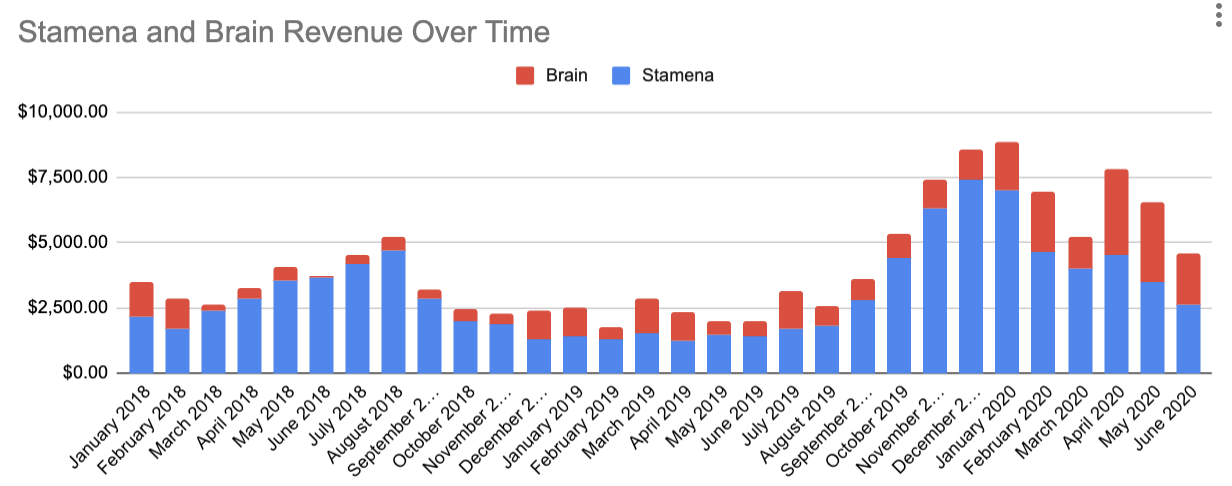
Stamena
Stamena was the first product for this site. Some of the men’s sexual health related articles started doing well and I realized there was no iOS app targeted at men to help them do kegel exercises. So, I got one made, plugged it into the articles, and it's been a Top 100 Health app ever since, now with over 800 reviews:
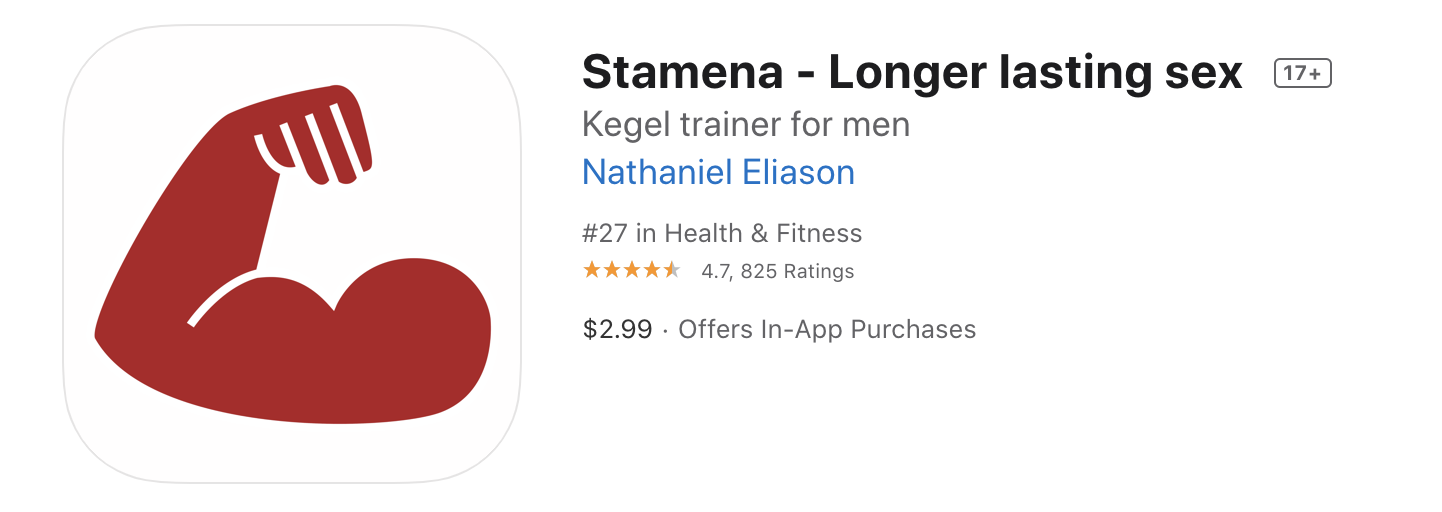
This was the ultimate passive income product. The audience already existed, so once it was made all I needed to do was link to it in the articles and it started selling. Obviously if I lose the traffic it won't sell as well, but it's been going strong for 4 years now and has earned back more than 25x the development cost. With all the reviews, too, it would still sell some even if the traffic went away.
Best of all, I've only had to update it twice since it's such a simple product. Tons of other people have tried to make competing male kegel apps since then (including literally copy & pasting the design), but since I have the traffic none of them have done particularly well.
The Brain
The Brain had a similar inspiration. My book notes were starting to get more traffic, but their value was limited by being standalone pages. So, I created an Evernote notebook of all my highly annotated notes, turned it into a product, and started selling it on all the book notes pages:
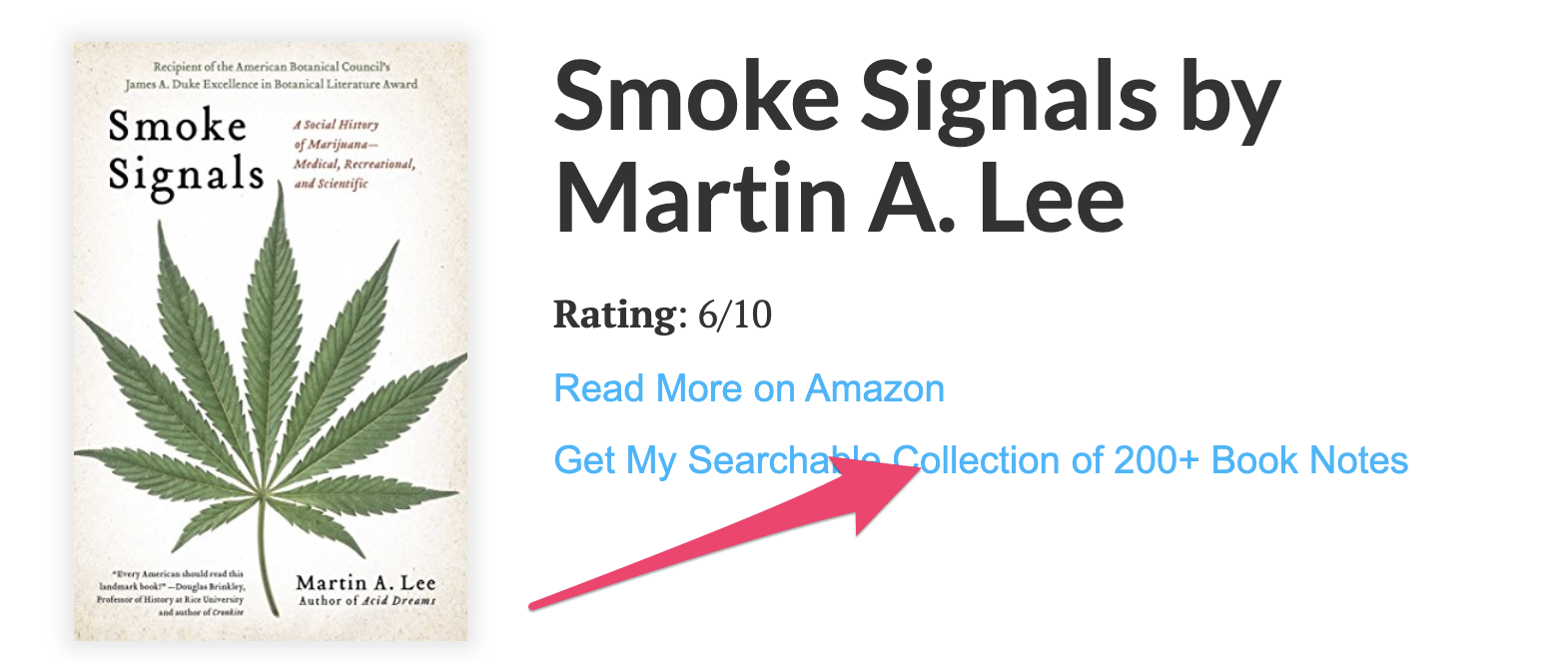
Once again, I already had the traffic and the audience, I made a product I figured they would like and would add value to what they were getting for free. And then I set it up in Gumroad in such a way to make it easy to manage passively, with maybe 20-30 minutes of work per month.
The Roam Course
Then there's the Roam Course. I could not have predicted how well this would go, even with how strong the initial interest was. I wrote the article about Roam which blew up, and turned a number of my smart friends on to using the platform. Then in the span of about a week, four or five people suggested I make a course on it (I owe thanks to Justin, Wilson, Kevin, Cathryn, and Adil here).
So, I tweeted about it to see if people were into it. Despite capping it at 25 people I ended up getting PayPal payments from ~50, then more pre-orders over the weekend on Teachable, and within a week the course had pre-sold $3,000 - $4,000.
Then I started putting up the actual videos and opened the early access signups to the public, and it sold another $8,600 in the first month.
Then... Roam decided to sponsor the course for a little while, offering $100 in free credits for Roam to anyone who completed the course before Roam turned on pricing. That week it made another $22,000, plus $12,000 the week after, and it's been doing better than I could have imagined ever since.
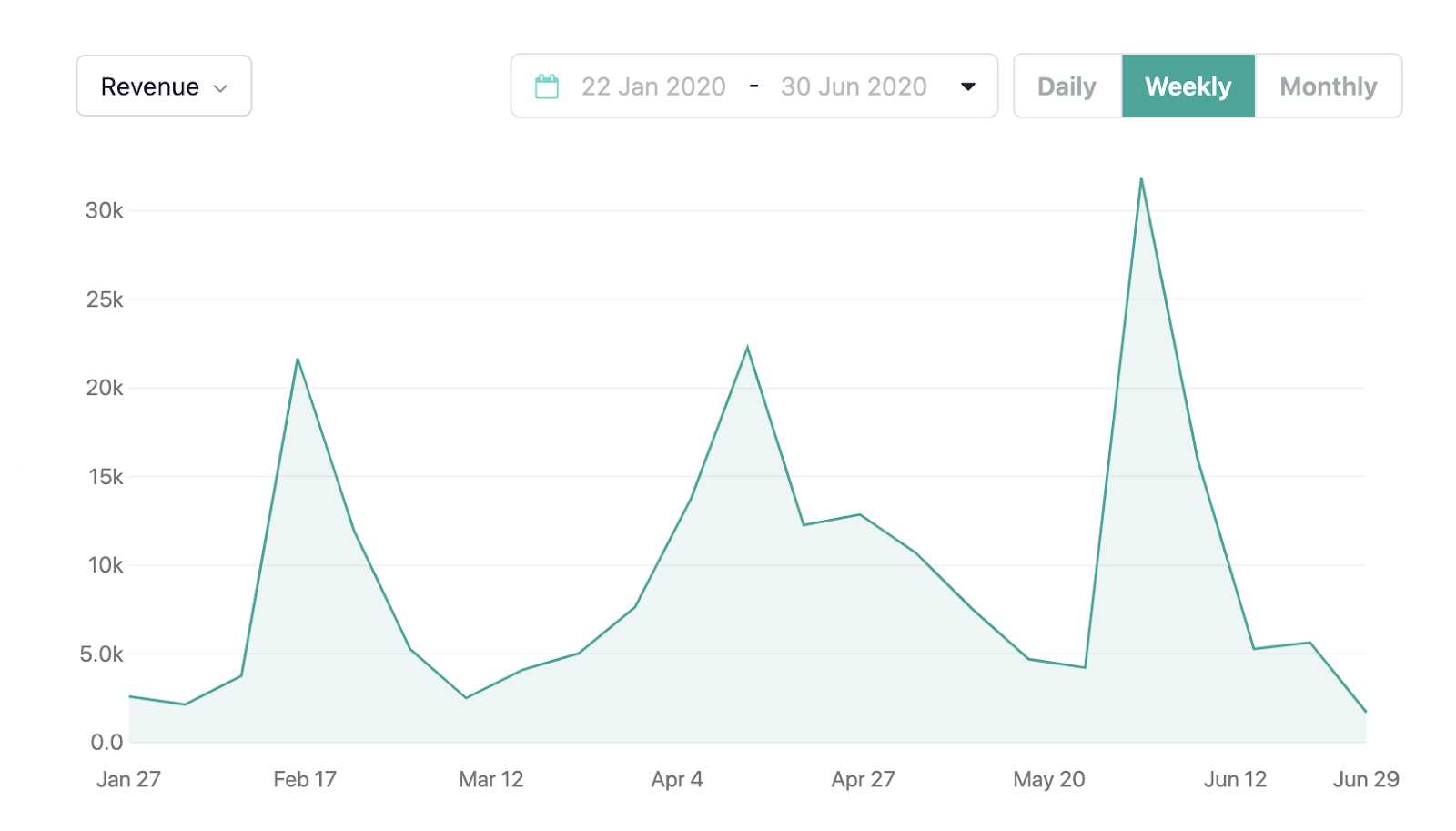
The three spikes are, in order:
- When Roam said they would subsidize it
- When Roam made a joke about not subsidizing it anymore (seriously)
- When they set the real deadline and I did a "last call" email
In total, the course has made $222,334 since the end of January when it launched:

I know, it's fucking insane. I don't really believe it either, but even now that there's no free $100 in credits it still typically does $300 to $500 a day.
So when we remake the graphs from earlier, it's clear the Roam course destroys any other past monetization I've done on this site:
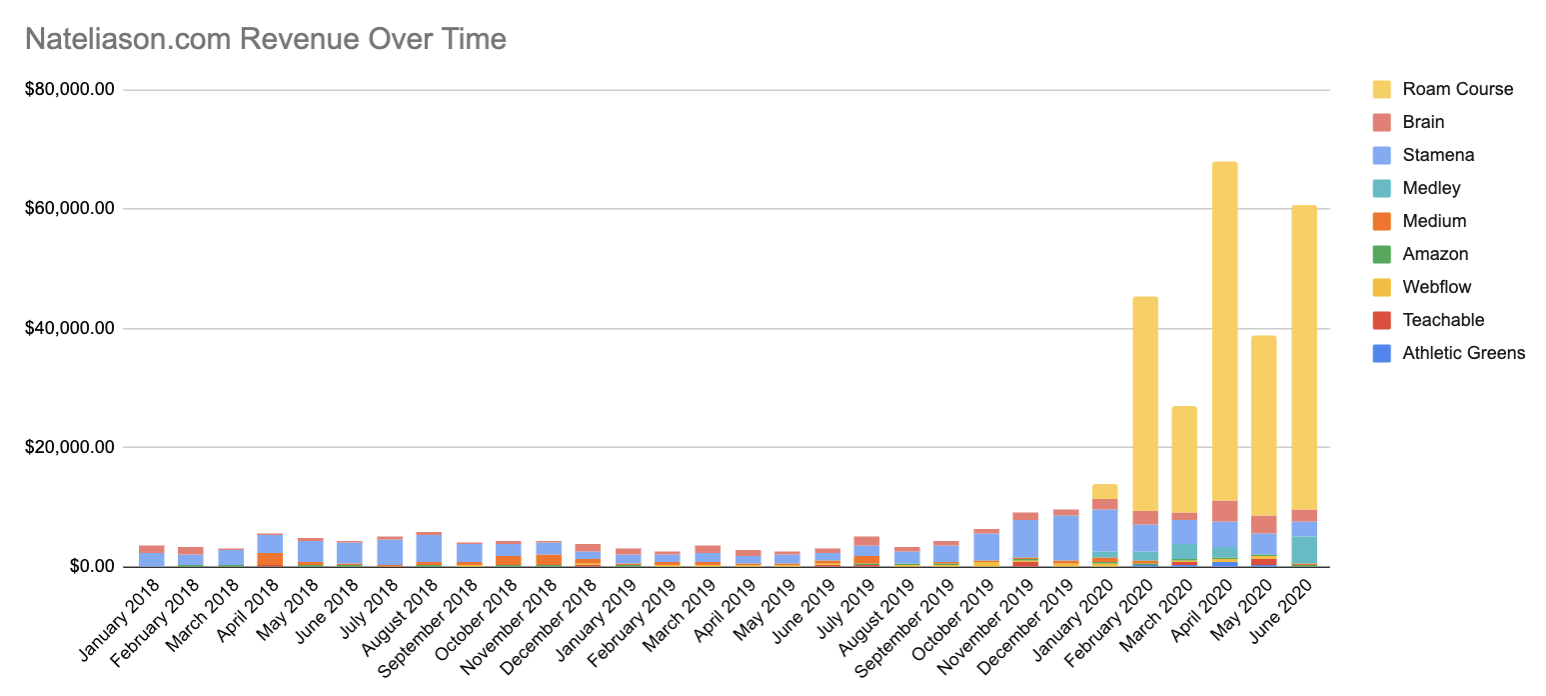
What’s the lesson here? Well, if a few of your smart friends tell you to make something you're also motivated to make, it's worth taking a stab at. And when you make something that does well (in this case, the Roam article) and there's a clear way to double down, you should go for it.
The Roam Course exemplifies the product-focused strategy for blog monetization. Treat each article as a little MVP, and when one does well, find a way to better monetize that line of thinking.
I suspect if this article does well there'll be some product from it too. Heck maybe you're reading this later and there already is! Publishing an article is an extremely low cost way to test business and product ideas since you're making sure you have interest and an audience to market to before you build anything, instead of spending months building something and then hoping people will be interested in buying it.
Growth Machine
Growth Machine isn't really a product that's part of the blog, but it certainly came from the blog. The first few Growth Machine clients were all people who reached out to me after reading articles on this site. Those first clients showed me there was a demand for premium SEO consulting, which I then turned into creating the agency.
Growth Machine will do somewhere between $2.5 and $4 million in revenue this year, so in many ways it's the REAL biggest product from this site. We have 12 full-time people now, employ 30-40+ contractors, and get to work with some of the coolest tech startups and ecommerce companies. And it all started with this article.
So when we talk about "starting a blog that can change your life," Growth Machine is the ultimate example. You never know when one article might define what you work on for the next few years.
Getting Started
The challenge with reading a post like this is the thought in the back of your head that doing all this seems totally impossible.
650 pieces of content is lots of work. 6 years is a long time. And who’s to say you’ll get the same results?
That shouldn’t deter you though. I don’t know a single person with a personal site who regrets investing in it. But I know a number of people without personal sites who wish they’d started one sooner.
If you want a series of quick wins to build momentum, get your site built (remember, don’t overthink here!) and try to get 10 articles done in the next month. You don’t even have to show them to anyone. Start getting yourself in the habit, and I promise (promise promise promise) it gets easier over time.
Don’t get hung up on comparing your progress to mine or anyone else’s. We’re all on different paths, and “changing your life” can mean different things to different people.
I can’t guarantee that following what worked for me will get you to the same place I am.
But I can guarantee it will get you somewhere you never expected.
If you want to learn more about growing a site like this, definitely check out SEO for Solopreneurs .

